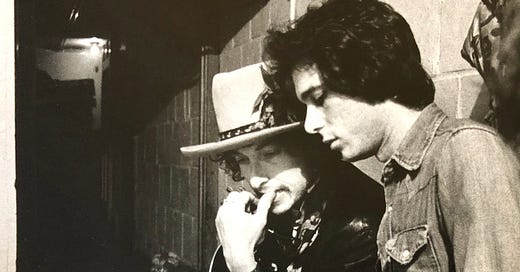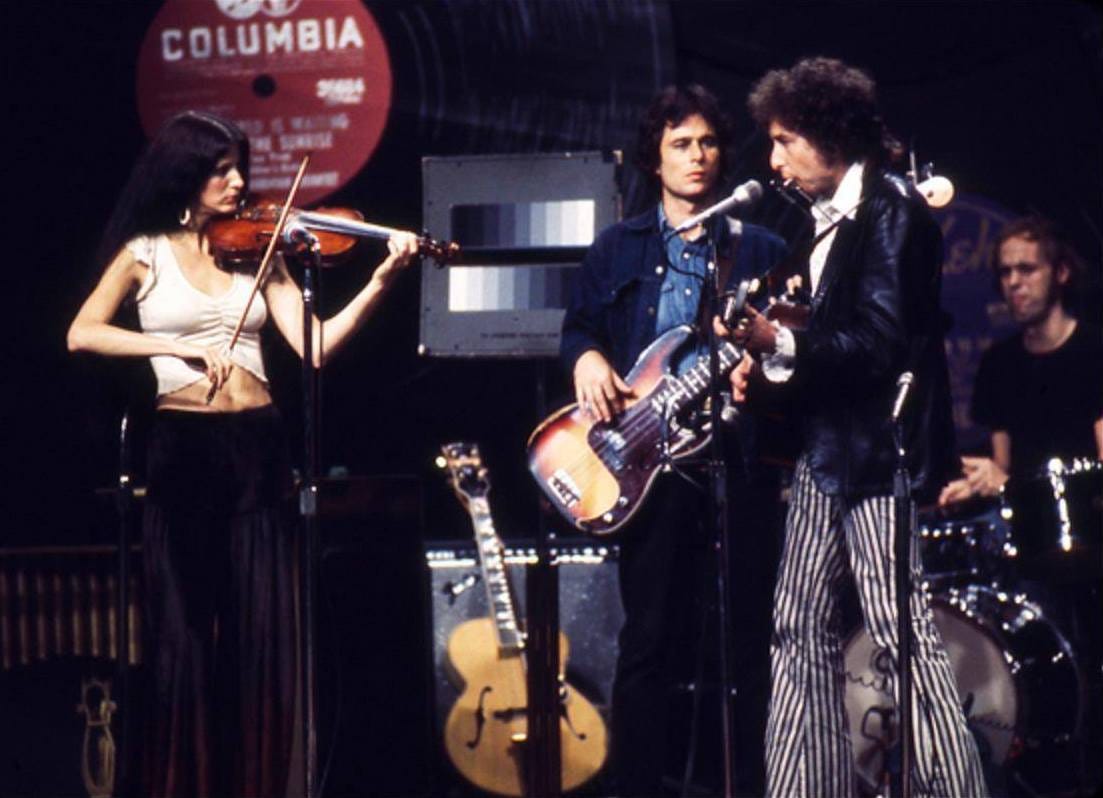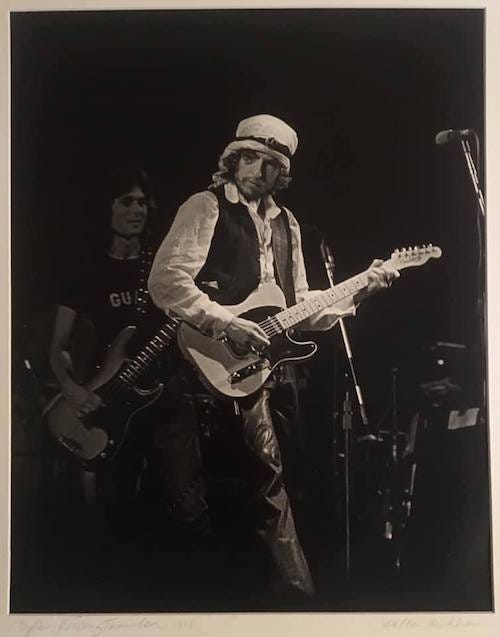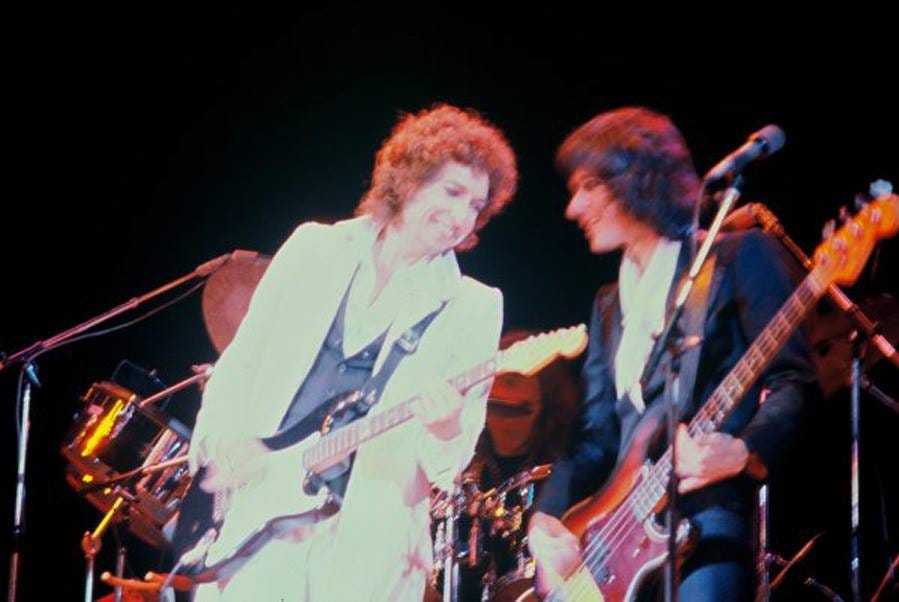Update June 2023: This interview is included along with 40+ others in my book ‘Pledging My Time: Conversations with Bob Dylan Band Members.’ Buy it (hardcover, paperback, or ebook) here!
Today, our second interview, and another one pegged to a New Orleans show. Appropriate, as this would have been the second weekend of Jazzfest (WWOZ is streaming Jazzfest sets past all weekend). Unlike Dickie Landry, who last week told a killer story of playing with Bob for one night only in 2003, today’s subject played with Bob for years.
Rob Stoner was Dylan’s bandleader and bassist for both the ‘75 and ‘76 legs of the Rolling Thunder Revue and the first leg of ’78. He played on Desire and helped put together Bob’s touring bands, which became known as “Guam” in the Rolling Thunder years. He even made the setlists each night; that photo up top is of him running one by Bob before a ‘75 show.
The ‘75 Rolling Thunder tour was explored exhaustively last year; Rob did great interviews about it and the Scorsese doc at Aquarium Drunkard and his local paper. And he had a hell of a career before and after Bob (Link Wray! “American Pie!”); The Vinyl Press has a good interview on all that that’s worth checking out too.
But us, we’re focusing on the half of Rolling Thunder that hasn’t gotten as much attention of late: 1976.
Well, mostly. We couldn’t start without the story of how he entered Bob’s orbit in the first place, and we touch on ’78 briefly at the end.
Note: This interview has been edited and condensed. But not much. I figure anyone subscribing to a Dylan-concerts newsletter is as interested in the details as I am. And if you don’t subscribe yet, here’s the button, these will arrive in your inbox every week or so:
You met Bob several years before Rolling Thunder. Tell me about it.
I was working with John Herald, who was the lead singer of the Greenbriar Boys. Bob Dylan used to be the Greenbriar Boys' opening act when he first came to New York in the early '60s [including at the ’61 show Robert Shelton famously reviewed for the Times]. The Greenbriar Boys were maybe the most successful and well-regarded of the urban bluegrass groups. I was kind of a well-known bass player and singer in Manhattan. John had hired me as one of his sidemen.
We played a gig in LA in ‘71 or ’72, and Dylan came to the gig to see how the band he had been the opening act for was doing. In the show, John Herald would allow the individual members to each do a little solo segment. Dylan took note of this and saw that I was also a competent lead singer.
After the show, we went back to Kris Kristofferson's hotel room at the Chateau Marmont. Every so often, Dylan and I would pick up guitars, and he would try to stump me regarding obscure bluegrass tunes, since he'd seen me play with this bluegrass group. Bob, being a student of these kind of tunes, would say, “Hey, you know this one?” thinking that he could find one I didn't know. But I knew all these tunes, 'cause I loved them too. Not only did I know the [music], but I knew the words, so I could harmonize with him.
I knew at that time, this guy's auditioning for some future thing. A guy of Bob Dylan's stature would not sit around and jam with an unknown person for hours and hours unless they were checking 'em out to add to their book of potential future hires. I found out subsequently that Bob was in the habit of doing this. He knew the guys in The Band were not going to be working with him forever, and he needed to have a nice group of musicians that he could choose from. So we stayed up 'til dawn jamming on these obscure tunes.
At the conclusion of our initial meeting, Dylan had said, hey man, we're going to do something together some day. At the time, I took that as just one of those platitudes that people always say. "Oh yeah, we'll get together and jam." I just took it as loose talk. But he actually made good on his word.
I know the general story of you playing a lot around Bleecker Street in ’75 when he was seeing shows and hanging out, but was there a specific moment where he came up to you? An invitation?
His producer Don DeVito telephoned. I knew Don because I was already on Columbia Records as a solo artist. I had country records out. So I get this call from Dylan's producer. "Dylan wants you to come to the studio to see what's wrong with his record." I was kind of surprised. It had been like four years. I hadn't heard from him.
So of course, I went right uptown to the recording studio. I brought my instrument, but I didn't play. I listened to what was going on. At the conclusion of the session, Dylan takes me aside. He said, “What would you do if this was your session?” I told him, “I would send everybody home. Come back fresh the next night with a much smaller group.” And he took my advice. We recorded the whole thing in one session basically. That gave him some confidence in my decision-making ability.
Then I noticed him showing up at my gigs. I had my own band I'd play around the Village in. Dylan would come to my gigs to hear me with my band. About a month after this, he called me to go do a gig with him in Chicago on TV for which we had not rehearsed or anything. For the group that he contracted to do that, he had the same people who played on Desire, which was basically the drummer from my band, Howie Wyeth, and a violinist, Scarlet Rivera.
I read an interesting sentence in researching this. I wanted to see if you remembered it. It was, "After finishing recording the John Hammond TV special at 2 AM, Dylan walks around Chicago with bassist Rob Stoner before flying directly to Los Angeles."
This was the first time I'd ever gone on the road with Bob Dylan. I mean, the first day working with him anywhere other than in the studio. And I'm a guy who likes to stay up late and go for walks at night when there's nobody around and everything is mellow. I used to be in the service, and when I would go to a new port, I'd go walking around all night, just to check out the town.
We had done the TV show and then, later that night, everybody retired to their rooms. But I went out walking. As I'm leaving the hotel, I see Dylan sitting there in the lobby. He says, “Where are you going?” I told him, “I like to go out and take walks late at night and look at stuff.” He said, “Oh, I like to do that too!” So we started walking around the town together.
We subsequently ended up doing that on the road on many occasions. It was a great way to wind down after the show, when you still have a lot of energy. We didn't talk much. We were just looking at stuff. Taking in the sights.
If it's alright with you, I'd like to fast-forward a little to ‘76, which I feel is a little undervalued these days. After the ‘75 leg wrapped, did you know there would be a round two?
No. Every time I ever finished a project with this guy, I had no idea if he'd ever call me again. He didn't put anybody on retainer, he didn't say clear your calendar for this period or that period. Very noncommittal. In fact, for the entire year of 1977, I never heard one word from him.
After the Chicago gig I was talking about a minute ago, I had no idea he was going to call me for Rolling Thunder. Nobody knew there was gonna be a Rolling Thunder. Apparently he had been planning it for a while, but he didn't tell anybody. After the Chicago gig, I had no idea if we'd passed the audition, if he'd been satisfied with our work on the TV show or not. It was just like a payday, union-scale gig. I was quite surprised a couple months later when he called and said, we're doing to do this tour.
And at the end of the '75 tour, it was the same thing! It was a nice handshake, a thank you, they give you your last check, and it's like any tour when it ends. There was some vague talk about, we're going to do it again, but unless you see an airline tickets and a check, it's not definite.
It seems like you could have just kept doing the '75 shows in bigger rooms the next year relatively easily - mostly the same people, do mostly the same thing - but the '76 sound is so different. Was that a mandate from him? Did that come through rehearsals?
The rehearsals were kind of nonexistent. We had gone down to Clearwater Florida and taken over this hotel to ostensibly rehearse, but Bob hardly ever showed up. So we didn't know what the hell he wanted! As the bandleader, I would call rehearsals anyway. We'd show up and rehearse without Bob. I'd be singing the songs in his keys as a stand-in.
Even though Bob wasn't there, we tried not to replicate what we'd already done. We knew that was totally redundant. When you hear, say, the Hard Rain album or anything from that time, you'll notice that the tunes have been dramatically reworked. That came from basically the rehearsals we did when Bob wasn't present. Then he'd finally show up and he'd say, oh yeah, this is a nice change of pace. [Or] Bob would have ideas about how to totally rework the tunes. He'd come in and show us one time and then we'd subsequently work on them.
When you're rehearsing, are you rehearsing the other people's portions as well?
Yeah, of course. We go over that stuff when Bob or Joan or the major principals are not around. We don't want to waste their time. T-Bone did a song, Steven Soles did a song, David Mansfield.
And you did a song. This New Orleans show has you doing your own "Too Good to Be Wasted." How often did you play that?
I did either "Too Good to Be Wasted" or the Dylan tune "Catfish.” I'd heard Dylan do it at the Desire sessions. It was a laid-back folk/blues thing. But I re-envisioned it as a heavy metal song. Because I had Mick Ronson there. I'm trying to emulate Bad Company, the heavy English rock that was popular at that time. That was the one I did most of the time, because it was a real crowd-pleaser, it had a nice bass solo in it, Ronson got a chance to stretch out. Very rockin' tune. That was the only hard rock tune of the whole night.
Did you have to get Bob's sign-off to play his song?
Yeah, I think I asked him. I said, “Is it cool if I do this tune? You planning to play it?” He said, “Naaah.” He didn't regard it as an important tune. It was a throwaway to him.
He knew that he had to do his hits and his recent stuff. When you look at the list of tunes [in ‘76], it's a few of his hits, but basically he's got a lot of reworkings of tunes from Blood on the Tracks. I gotta say, the versions of the Blood on the Tracks tunes like "Idiot Wind" and "You're a Big Girl Now,” I think they were superior to the original records.
Was that something you all worked out during rehearsals? Did he say, I want to do more Blood on the Tracks songs this time, figure it out?
He wouldn't say that. Bob is a man of few or no words. He'll just start playing and you better follow him. He'd never tell you, “Oh we're doing a song from Blood on the Tracks.” He'd just start playing some chords and you start following behind him. After about thirty seconds, you might recognize what song it is, but meanwhile you're just watching his hands, trying to play the right chords.
I mean, some people like to work stuff out meticulously, but Bob was not one of those guys. He liked to try and surprise people. Not only the band, but the audience. Sometimes he'd start a tune in an actual concert and we'd have no idea what the hell tune he was doing. All we had to do was keep it going. If it worked out, we'd do it on subsequent nights. If not, you never heard the song again.
Did you know the Dylan catalog well enough yourself that you could be like, oh, this is thus-and-such song from '64, I can play this?
Oh yeah. I was such a huge fan. To this day I think Blonde on Blonde is one of the best records I've ever heard. When I was a kid, I loved Dylan, man. So therefore, working with him was really a thrill. I was already familiar with his stuff - not that that did me in any good! By the time we did a song, it had no resemblance to the way that I had heard it all the years previously.
On May 3, 1976, you played in New Orleans. Any chance you remember anything about those gigs specifically?
Well I remember that we played two shows there. I mean, New Orleans is such a memorable town, you don't forget going to New Orleans. But I don't remember anything particularly about the shows. [Note: Only the evening show circulates.]
Dennis Hopper shows up onstage and reads a poem during the Guam set.
That's cool! I didn’t remember that. He just showed up for that show. Probably because he wanted to go to New Orleans since it's such a great party town. All kinds of movie stars and celebrities would periodically drop in for a gig or two. Hopper was hip enough to know that New Orleans was the one to show up for.
The other claim to fame for this New Orleans show is that it's apparently the only time you all played "Rita May."
That's right! You know, there's a really cool rehearsal recording of that on that new box set. I'm singing the high part Emmylou sings on the recording. Emmylou never did one gig with us. When we played live, I sang all her parts. So on that rehearsal, it's me and Bob singing it.
So that was the only time we played it live huh? I have that PA tape. Someone sent it to me once. It's pitched too high. The tune is supposed to be in D, but when you hear it on the tape it's in D-sharp. Everything sounds thin and tinny and fast. The problem with a lot of those board tapes is they get remastered and disseminated in the wrong key. I hate the sound of that PA tape because it's always too fast! But the one on the rehearsal, on disc one on the box set, that's the right key.
Maybe they'll do another box for '76 and someone can go in and remaster---
I hope so! That would be great, man. Let's hope they do. You know, I'm sure they'll figure it out. Figure out a way to scrape the bottom of the barrel and get some more money out of Bob Dylan fans before they're all dead.
In an interview you did last year, you talked about '76 a little and a quote that struck me was "the bloom was off the rose." What specifically did you mean by that?
The problem is…back then, he was not into repeating himself. The fact that he was going out to do the same thing again didn't sit with well with him.
But I think more than that, [there were] marketing mistakes on the '76 tour. They had no idea what Bob's draw would be in those parts of the country. The Southeast for example. They booked him into large places which he could not fill. Many gigs were cancelled for lack of ticket sales.
Since then, he's become more realistic, or his people, about his ability to sell tickets. They book him into smaller places. Back then, they were testing the waters, and they thought that his draw in the Northeast was representative of his national draw, but it was not. He was much more popular in the Northeast, and always has been, than he was in the hinterlands. So when we went down south, they had a rude awakening. They could not fill these joints. We did great when we played a college. But when they played the Hofheinz Pavilion [in Houston] on May 8, they had to bring Willie Nelson in as the opening act to help the draw. They weren't selling tickets. They had cancelled the date before that and they cancelled the date after that for lack of ticket sales.
So that's kind of discouraging. You're coming off this heady Rolling Thunder thing and suddenly…people aren't showing up. That takes the wind out of your sails.
How much did that all affect the mood of the band, backstage, the whole feel?
All of that mood stuff in the band is always set by the main guy. The train follows the locomotive. And the locomotive was dragging, discouraged. Like, I'm not selling tickets, this is embarrassing. You definitely pick up on that stuff. Of course, everyone's professional. You go out and give it your best shot.
When he played minor league baseball stadiums ten or fifteen years ago, that is Bob Dylan's ideal sized venue. When he comes to New York City, he does not play Madison Square Garden like Billy Joel or Elton.
Yeah, he plays the Beacon these days.
He plays the Beacon Theatre! Exactly. Because eventually he wised up to the fact that his draw is more in line with that than the stadium, mega-rock act draw.
You mentioned the cancelled dates in Texas. Another thing I read said on one of those dates you all did a show for a local juvenile hall instead. Do you remember that?
I don't think I made that particular side trip, but I know on the days off they would always schedule some kind of activity to keep everybody amused.
Do you remember what any of the other activities were?
We'd go out to somebody’s house. One time, when we were in Texas, Kinky Friedman invited us all to his parents' house for a BBQ. Another time, we all went to Bobby Charles' ranch for an alligator cookout. Depending on what the geography was and who we knew in that area, we'd get an invitation for some kind of southern hospitality.
Overall, even if it wasn't quite as enjoyable, do you think musically ‘76 stands up to '75?
Totally! It's got its own vibe. Much more of a punk-rock vibe than the '75 stuff. It just evolved that way. It definitely wasn't just a repeat of the '75 thing. It was more rocking.
What was your feeling about '78? That seemed like a totally different vibe yet again.
That was a horse of a different feather. Bob told me he wanted to totally reimagine everything. He wanted to hear himself in a bigger setting with a larger ensemble. We talked about this on the phone. He told me to come out to L.A. and start auditioning people to put together this large group. He said, I want a horn player, I want girl backup singers.
So we auditioned all these people and ended up with a 12-piece ensemble, which was the largest setting Bob Dylan has ever been heard in. It became just a touring machine that rocked for over a year. Bob finally made some money there.
Did you enjoy it as much as the earlier tours?
You know, it was a different vibe. I can't really compare them. It was a well-oiled machine. Things were a little more predicable than the Rolling Thunder stuff.
I was glad to see Bob could go out and do the entire show by himself, which he hadn't been for Rolling Thunder. He had all these other acts to rely on. But he'd get out there night after night, just like Sinatra or Streisand, and do his thing. He was Mr. Entertainment.
Why did you leave after the first leg?
I’m saving that one for my book. Just what the world needs, another old rock and roll guy telling his stories!
Rob hopes his memoir will be out next year. He’s a font of stories, and I’m anxious to read it. In the meantime, he’s recently started teaching guitar, bass, and voice lessons over Zoom. You can find out more about that at his website or by emailing rob@robstoner.com. Thanks to Rob for taking the time to chat.
1976-05-03, The Warehouse, New Orleans, LA - Bob Dylan sets
1976-05-03, The Warehouse, New Orleans, LA - Everyone else’s sets
(Baez, McGuinn, Hopper, Friedman, Weiss, T-Bone, Neuwirth, Ronson, Stoner, Soles, Mansfield)
Update June 2023:
Buy my book Pledging My Time: Conversations with Bob Dylan Band Members, containing this interview and dozens more, here!












